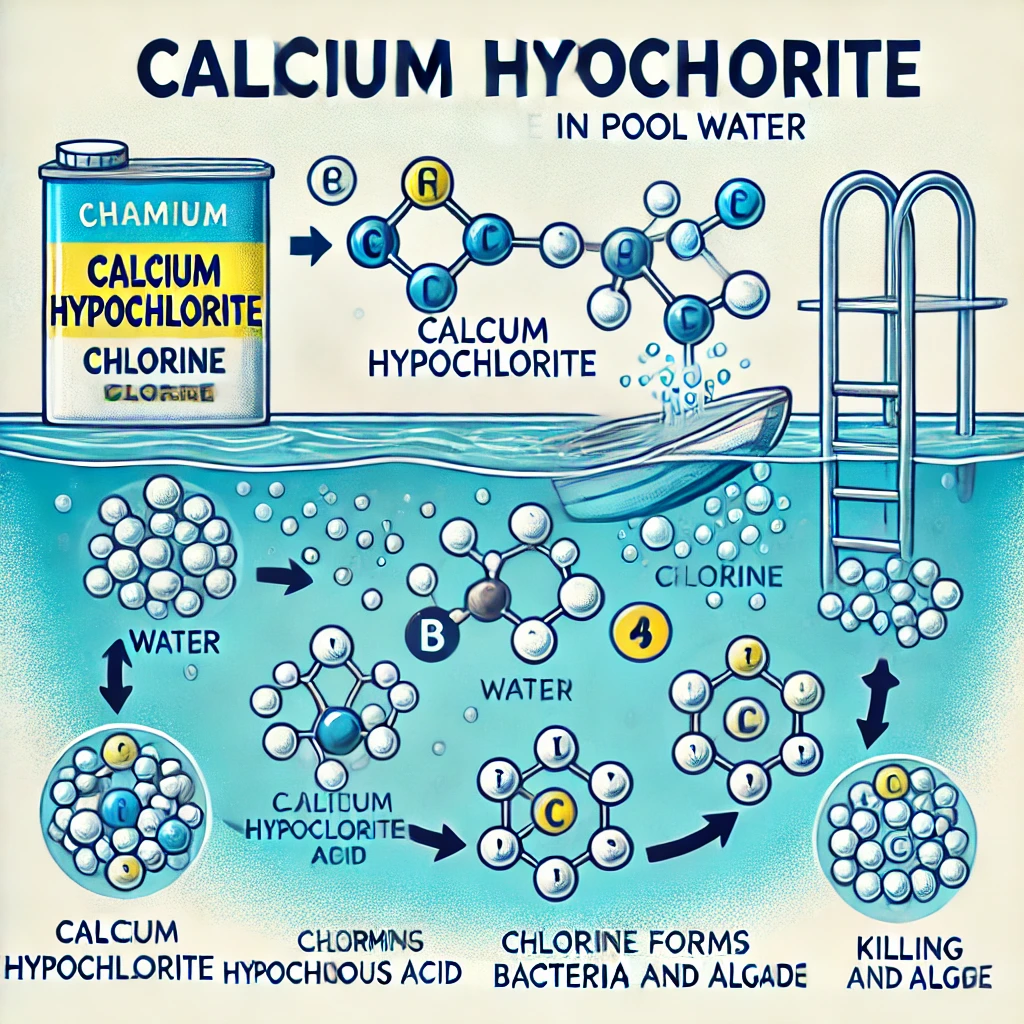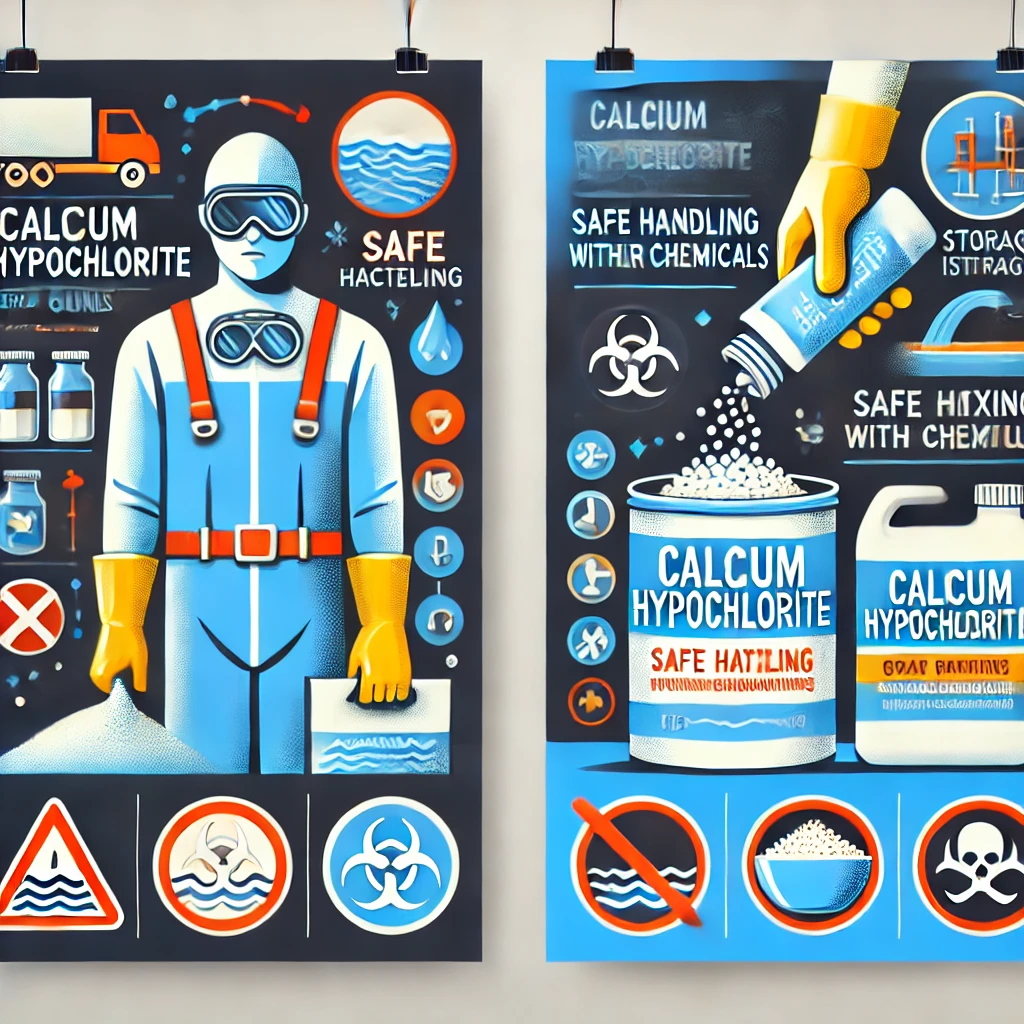Maintaining a clean pool is essential for both health and enjoyment. Calcium hypochlorite plays a critical role in pool maintenance. This compound, often used as a pool shock, ensures water remains clear and safe. In this article, we will explore the importance of calcium hypochlorite in pool maintenance.

I. Understanding Calcium Hypochlorite
Calcium hypochlorite is a powerful disinfectant. It is commonly used in pools to kill bacteria, algae, and other harmful microorganisms. As a chlorine compound, it releases chlorine when dissolved in water. This chlorine is the active agent that sanitizes the pool, making it safe for swimming.
1. Key Chemical Properties
Calcium hypochlorite is highly soluble in water. When dissolved, it releases a significant amount of chlorine, making it effective in sanitization. This makes it a preferred choice for maintaining pool hygiene.
2. Why It’s Effective in Pools
Its high chlorine content allows for effective disinfection, quickly neutralizing harmful organisms. This ensures the water remains safe and clear for swimmers.
II. The Role of Pool Shock
Pool shock is a term commonly used in pool maintenance. It refers to the process of adding a high dose of chlorine to the pool. This process is necessary when the chlorine level in the pool drops too low. Calcium hypochlorite is a popular choice for pool shock. It quickly raises the chlorine level, restoring the pool’s cleanliness.
1. When to Use Pool Shock
Pool shock is most effective after heavy pool usage, rainfall, or when the water appears cloudy. It helps to restore proper chlorine levels, ensuring the water remains safe.
2. Benefits of Pool Shocking
Regular pool shocking with calcium hypochlorite helps maintain optimal water quality. It prevents the growth of harmful microorganisms and keeps the pool water clear.
III. Benefits of Using Calcium Hypochlorite
Calcium hypochlorite offers several advantages for pool maintenance. First, it is highly effective at killing harmful microorganisms. This effectiveness ensures the pool remains safe for swimmers. Second, it is easy to use. Pool owners can simply dissolve the granules in water and add them to the pool. Furthermore, it is relatively stable, with a long shelf life, making it convenient for regular use.
1. Long-Term Stability and Storage
Calcium hypochlorite is known for its stability, which allows it to be stored for extended periods without losing its effectiveness. This makes it a practical choice for pool owners.
2. Ease of Application
The granules are easy to dissolve and apply to pool water. This convenience ensures that pool maintenance remains a simple and efficient process.
IV. Using Calcium Hypochlorite Safely
While calcium hypochlorite is effective, it is important to use it safely. Always follow the manufacturer’s instructions when adding it to your pool. Use protective gear, such as gloves and goggles, when handling it. Store it in a cool, dry place, away from other chemicals. Moreover, never mix it with other pool chemicals, as this can cause dangerous reactions.
1. Safe Handling Practices
Proper safety precautions are essential when handling calcium hypochlorite. Always wear protective gear and store it correctly to prevent accidents.
2. Avoiding Chemical Reactions
Never mix calcium hypochlorite with other chemicals, especially acids. Doing so can cause dangerous reactions, including the release of toxic gases.
V. Balancing Chlorine and pH Levels
Maintaining the correct chlorine and pH levels is essential. Calcium hypochlorite raises the pool’s pH slightly. Therefore, it is important to monitor the pH after shocking. If the pH is too high, add a pH reducer to bring it back to the optimal range. Keeping the pH within the correct range ensures the chlorine works effectively.
1. Monitoring pH Levels
Regular testing of pool pH is crucial. Keeping pH levels within the optimal range ensures that chlorine remains effective in sanitizing the pool.
2. Adjusting pH After Shocking
After using calcium hypochlorite, test the pool’s pH. If it’s too high, use a pH reducer to balance it out and maintain water quality.

VI. Conclusion
In conclusion, the calcium hypochlorite chlorine tablet plays a vital role in pool maintenance. As a powerful disinfectant, it keeps the pool water clean and safe. Its effectiveness as a pool shock makes it a popular choice for pool owners. By using it correctly and regularly, you can ensure that your pool remains a safe and enjoyable place to swim. Regular pool shocking, combined with proper monitoring of chlorine and pH levels, will help maintain the clarity and safety of your pool water.